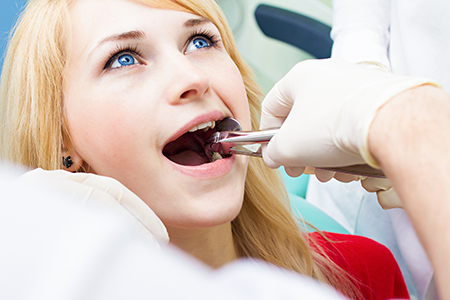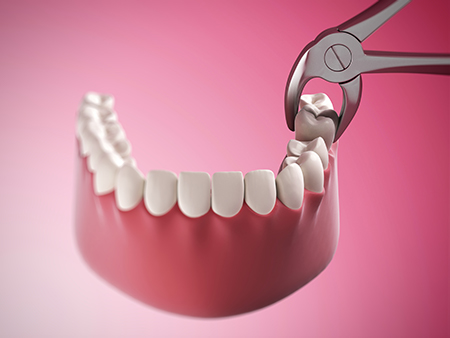
Our Office
652 Middlesex Ave
Metuchen, NJ 08840
Visit Us Online
At Metuchen Dentistry, our patients' care and well-being are our top priorities. Every member of our skilled and experienced team strives to ensure patient comfort and a stress-free dental experience. Our dedication to the consistent provision of compassionate and personalized attention along with gentle, precise care has earned us the respect and trust of our patients.
While we do everything in our power to preserve the integrity of your natural smile, there are times when it's necessary to extract a tooth to protect your oral health and overall well-being. If you need an extraction, you can rest assured that you're in good hands with Metuchen Dentistry.
At our office, we understand that the prospect of having a tooth extracted can be daunting. However, it's essential to recognize that extractions are sometimes necessary for maintaining good oral health. Our team is committed to providing you with all the information you need to make informed decisions about your dental care.
The reasons why a tooth extraction may be recommended can vary widely, but generally fall into several categories: impacted or overcrowded teeth, severe decay or damage, advanced gum disease, or the need to make room for orthodontic treatment.
Baby teeth that are over retained, severely decayed, or damaged
Most of the time, baby teeth will fall out on their own as a child's permanent teeth begin to erupt. However, occasionally, a baby tooth continues to remain firmly attached to the bone. Either the roots of the baby tooth have failed to resorb and shrink as intended, or the baby tooth has become anklylosed and fused to the supporting bone.
A permanent tooth that has extensive decay and is deemed non-restorable
Dental decay begins as a simple pinpoint defect on the outermost enamel layer of your tooth. If left untreated, it will continue to compromise healthy tooth structure as it works its way to the inner layers of the tooth. When the tooth has sustained far too much structural damage and cannot be restored, a dental extraction may be required.
A permanent tooth that has been severely fractured or cracked and can not be restored
There are many different types of chips, cracks, and fractures that can affect your teeth. The extent of the damage will determine if there is enough intact tooth structure to save the tooth and the type of treatment required.
Advanced gum disease that has significantly compromised the tooth's supporting tissues
Gum disease is the most common cause of tooth loss in adults. When left untreated, periodontal disease, which affects the hard and soft tissues supporting your teeth, can lead to gingival pocket formation, gum recession, and diminishing alveolar bone.
Poorly positioned, impacted, or decayed wisdom teeth
Wisdom teeth are the last permanent teeth to develop in the oral cavity and the final ones to come into place. They often do not have sufficient room to erupt correctly, are not developing properly, develop extensive decay, or cause issues for the adjacent teeth and the surrounding tissues.
Overcrowded Teeth
A tooth size to jaw size discrepancy often results in a crowded and misaligned smile. When the upper and lower jaws are not large enough to accommodate all the permanent teeth, extractions may be required as part of an orthodontic treatment plan.
A tooth extraction is a procedure that involves removing a tooth from its socket in the jawbone. At Metuchen Dentistry, our dentists use state-of-the-art technology and techniques to ensure that your extraction is performed with minimal discomfort and maximum efficiency.
A simple extraction is typically used for teeth that are visible in the mouth and have a relatively straightforward root structure. During the procedure, our dentist will use a local anesthetic to numb the area around the tooth.
Once the anesthesia has taken effect, the dentist will use a tool called an elevator to loosen the tooth from its socket. After the tooth is sufficiently loosened, forceps are used to gently remove it from the mouth. The extraction site may then be sutured if necessary.
The entire process usually takes only a few minutes, and patients can typically return to their normal activities soon after the procedure. However, it's essential to follow post-operative instructions carefully to ensure proper healing.
A surgical extraction is a more complex procedure that is typically used for teeth that are impacted, broken below the gum line, or otherwise difficult to remove using simple extraction techniques. This type of extraction may be performed by an oral surgeon.
The procedure begins with the administration of local anesthesia to numb the area around the tooth. In some cases, sedation may also be used to help patients relax during the procedure. Once the anesthesia has taken effect, the dentist will make a small incision in the gum tissue to access the tooth.
Using specialized tools, the dentist will carefully remove any bone or tissue that is obstructing the tooth. The tooth may then be sectioned into smaller pieces for easier removal. After the tooth is removed, the extraction site may be sutured and packed with gauze to control bleeding.

Following a tooth extraction, it's essential to take proper care of the extraction site to promote healing and prevent complications. Our team at Metuchen Dentistry will provide you with detailed post-operative instructions tailored to your specific needs.
The first step in caring for an extraction site is maintaining gauze pressure over the area. The dentist may place a gauze pad over the extraction site and instruct you to bite down on it to help control bleeding.
It's crucial to avoid activities that could dislodge the blood clot forming in the socket, such as rinsing your mouth, spitting, or using a straw. Instead, allow any liquids to gently fall from your mouth into the sink.
You can also use an ice pack applied to the facial area overlying the extraction site to help control swelling during the first day following your procedure. Avoid smoking and tobacco products for at least a week after the extraction to prevent interference with healing.
Preparing for a tooth extraction involves several steps to ensure a smooth and successful procedure. Our team at Metuchen Dentistry will guide you through the process, but here are some general tips to help you prepare:
In the days leading up to your extraction, avoid taking any medications that can interfere with blood clotting, such as aspirin or ibuprofen. You should also refrain from smoking and using tobacco products.
Plan for someone to drive you home after the procedure, especially if you will be receiving sedation. It's essential to have support during your recovery period as well.
Stock up on soft foods and liquids that you can eat comfortably following the extraction. Avoid hot or spicy foods, carbonated beverages, and alcohol for at least a couple of days after the procedure.
The first 24 hours after your tooth extraction are critical for promoting healing and preventing complications. It's essential to follow all post-operative instructions provided by our team at Metuchen Dentistry carefully.
In most cases, you will be scheduled for a follow-up appointment within a few days of the extraction to monitor your healing progress. During this visit, the dentist will remove any sutures if necessary and check for signs of infection or other issues.
After your tooth extraction, you may experience some discomfort, swelling, and bleeding at the extraction site. These symptoms are normal and should subside within a few days.
The recovery process can vary depending on the complexity of the extraction and individual healing factors. However, most patients can expect to resume their normal activities within a day or two following the procedure.

It's essential to attend all follow-up appointments and contact our office if you experience any unusual symptoms or concerns during your recovery. Our team at Metuchen Dentistry is always here to support you throughout the healing process.
The extraction site will gradually heal over the following weeks, with the formation of a blood clot that protects the underlying bone and nerve endings. As the clot dissolves, new tissue will form in its place, eventually leading to the complete closure of the socket.
If you're considering or have been advised to undergo a tooth extraction, our team at Metuchen Dentistry is here to provide compassionate and personalized care every step of the way. Our experienced dentists will work with you to ensure that your extraction is performed safely and efficiently, minimizing discomfort and promoting optimal healing.
The most common reasons for tooth loss include advanced periodontal disease, extensive tooth decay, and facial trauma. According to statistics, gum disease is responsible for close to 70% of tooth loss in adults. Although less frequent than the preceding three reasons, it should also be noted that specific diseases, drugs, smoking, and poor nutrition contribute to the risk of tooth loss.
The Centers for Disease Control and Prevention report that in the United States, an average of 12 teeth (including the wisdom teeth) are lost by the age of 50. Also, 26% of adults between 65 and 74 years of age have lost all their teeth.
Every patient and every situation is different. However, when a tooth and the surrounding tissues are numbed with a local anesthetic, you should only expect to feel a bit of pressure, but no pain as the tooth is being loosened from the surrounding tissues and extracted. For patients who are apprehensive and for some surgical extractions, our office will discuss our options in dental sedation to provide further relaxation and reduce any sense of discomfort.
While it's normal to feel some tenderness and swelling following an extraction, the degree of these sensations can vary. It mostly depends on the complexity of the extraction and the body's response to the procedure. We'll recommend or prescribe the appropriate pain medication to help ensure your comfort and give you specific instructions for maximum effectiveness and safety.
Typically, the recovery period following a simple extraction is shorter than a surgical extraction. However, a patient's overall health, habits, the size and location of the tooth, and other variables can influence recovery and healing. To speed up the recovery and avoid any complications, patients must follow the given at-home instructions diligently. We'll carefully review what to expect following your procedure and go over your post-op instructions.
Smoking interferes with blood clot formation, which is an essential first step in the healing process. Blood clot formation not only provides a protective layer to cover the underlying exposed bone and nerve endings, but it also supports the growth of new tissue. Cigarette smoke also contains chemical toxins that can disrupt the healing process and lead to problems such as continued inflammation, infection, or dry socket.
In a very small percentage of cases, a condition known as dry socket can develop in the aftermath of a dental extraction. This painful condition can arise when the blood clot in the extraction site doesn't form properly or gets dislodged. With dry socket, you may experience throbbing pain and symptoms such as bad breath and an unpleasant taste in your mouth. As skilled providers of care, our office will provide immediate treatment to alleviate your discomfort and promote healing.
The last teeth in your mouth to develop, wisdom teeth often do not have enough room to fully erupt or may be positioned in the wrong direction. These issues can affect your dental health as well as overall wellbeing. While some individuals never develop all their wisdom teeth, and a few have sufficient space for them, there are many people with partially or fully impacted third molars. Our office will monitor the development, position, and health of your wisdom teeth and will advise you if and when extractions are indicated.
After a tooth is removed, bone-grafting material is sometimes placed in the socket to promote healing and encourage new bone development. This procedure is often performed to support the eventual and successful placement of a dental implant.
At the office of Metuchen Dentistry, we strive to make dental care affordable and accessible. Depending on the type or complexity of the extraction and other variables, the cost of the procedure can vary. Based on our diagnostic findings, our office will inform you of the healthiest choices in care, explain the fees, discuss insurance coverage, and explain your payment options.
Many dental plans offer some level of coverage for tooth extractions. We'll advise you if your plan covers the full cost of the procedure and if there is any out-of-pocket expense. Our business office will work with you to maximize your insurance benefits as much as possible while helping you minimize any out-of-pocket expenses.
